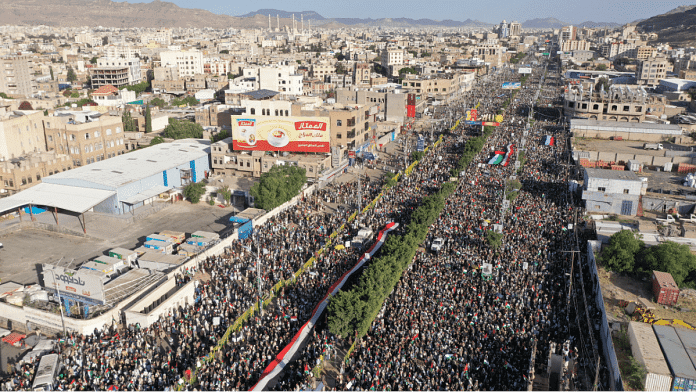New Delhi: A show of unity by the Arab world in the form of its strong condemnation of Israel’s continuing strikes in Gaza could delay further normalisation of ties between Israel and its neighbours in the Middle East, academics and public policy experts based in the Middle East have told ThePrint.
Israel’s retaliatory strikes and imminent ground invasion of Gaza in response to the attack by Hamas — that left 1,300 Israelis dead, over 3,000 injured and at least 203 taken captive — has led to panic across the leadership of the Arab world, as thousands of civilians hit the streets in protest. Horrific visuals of the attack by Hamas on 7 October have been overtaken by those of the death and destruction caused by Israel’s strikes in Gaza.
“Arab leaders are in a real state of panic. In the eyes of their people, they are seen crippled and not rising up to what’s expected from them. The leaders of the countries closer to the war, specifically Egypt and Jordan, are the most nervous,” Khaled Al-Hroub, a professor in residence of the faculty of liberal arts at Northwestern University in Qatar, tells ThePrint.
He adds that “all efforts by Israel and the U.S to marginalise the Palestine cause have collapsed” and that this will give more space to the Arab leaders to step up their emphasis that a solution for the Palestinian cause is the “only entry point for stability in the region”.
On Tuesday, the Hamas-run health ministry in Gaza reported at least 471 dead after a blast tore through the Al Ahli Arab hospital.
The total number of casualties, however, remains unverified since a probe is still ongoing, as the Palestine Red Crescent Society, a humanitarian organisation part of the International Red Cross and Red Crescent Movement, noted in its daily update on 18 October.
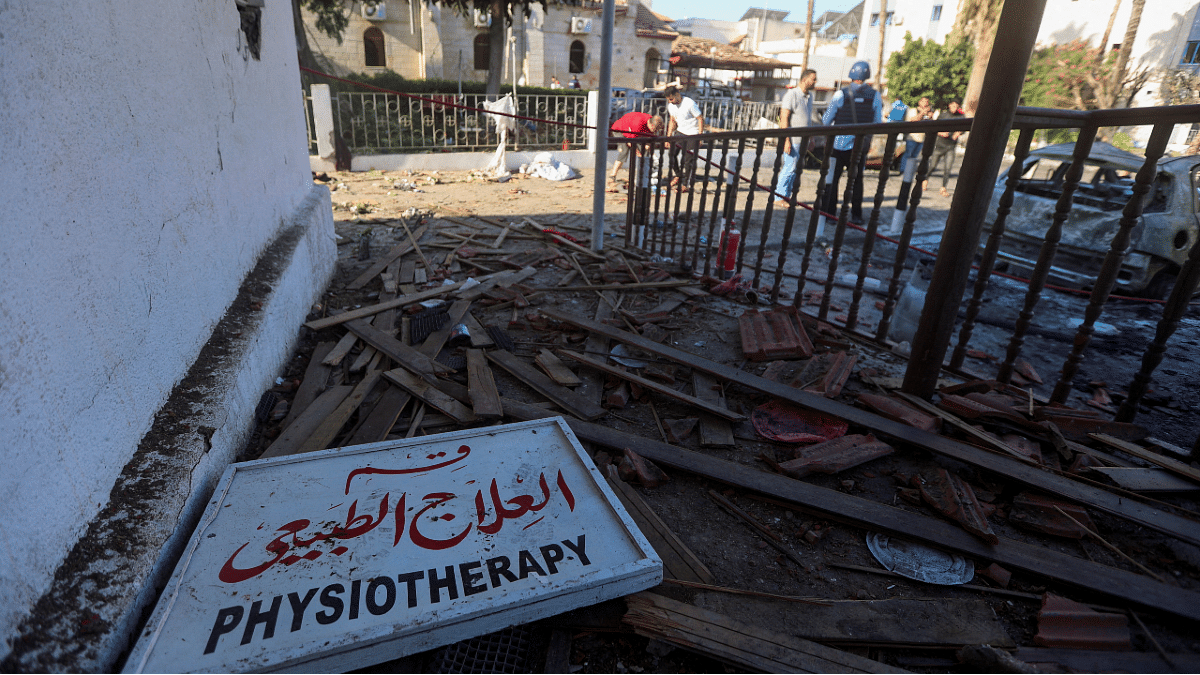
But the aftermath of the hospital blast witnessed protests breaking out across the region.
In Beirut, Lebanese security forces used tear gas and water cannons to disperse protesters demonstrating near the US Embassy, while elsewhere in the city thousands mobilised by a call from Hezbollah gathered waving Palestinian flags, according to reports.
In Istanbul, a reported 80,000 protestors gathered outside the Israeli consulate — a few even attempted to storm the consulate armed with sticks, stones, torches and fireworks. Demonstrations were also reported to have been held near the US consulate in Istanbul.
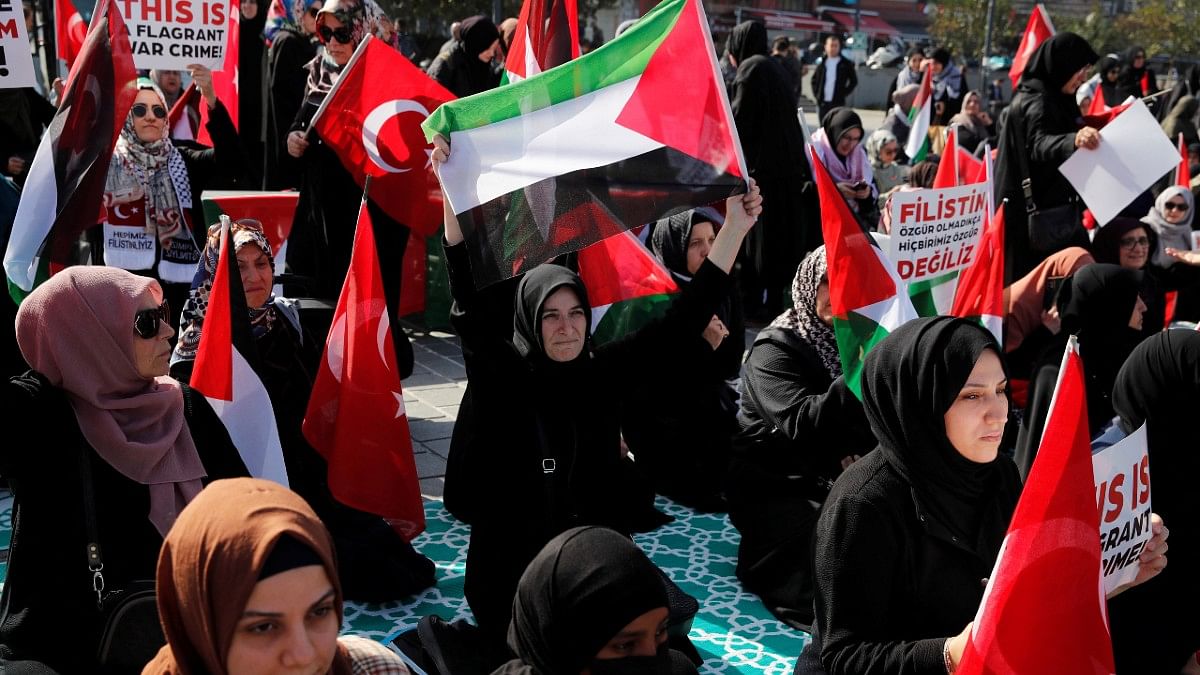
In Rabat, Morocco, the Israeli ambassador and his staff were repatriated after calls for a mass demonstration were seen circulating throughout the North African nation, reported Jerusalem-based Times of Israel.
The immediate result of these protests can be seen in the changing tone of statements from countries in the Middle East.
As ThePrint reported earlier, the UAE, which normalised ties with Tel Aviv in 2020 and since became a partner in the I2U2 forum — Israel, India, the UAE and the US — called for an ‘immediate halt’ of the conflict and condoled the death of Israelis. Abu Dhabi was also among the first to condemn the “Israeli attack that targeted the Al-Ahli Baptist Hospital”.
Saudi Arabia, which earlier called for an ‘immediate halt’ to escalation, strongly condemned the hospital blast, calling it a “heinous crime” committed by “Israeli occupation forces,” in a post on X (formerly Twitter).
Saudi Arabia condemns in the strongest possible terms the heinous crime committed by the Israeli occupation forces by bombing Al Ahli Baptist Hospital in Gaza, which led to the deaths of hundreds of civilians, including children as well as injured and wounded individuals. pic.twitter.com/l2jVTulVeN
— Foreign Ministry 🇸🇦 (@KSAmofaEN) October 17, 2023
In 2020, Israel signed the US-brokered Abraham Accords in a bid to normalise ties with four Arab countries: the UAE, Morocco, Bahrain and Sudan. It was also reported to have been working on strengthening ties with Saudi Arabia, with help from the White House.
As ThePrint reported earlier, Palestinian authorities and the militant group Hamas, in control of the Gaza Strip since 2007, blamed Israel for the Gaza hospital blast — a claim denied by Israel. Israeli Prime Minister Benjamin Netanyahu and US President Joe Biden have, in turn, alleged that the blast was caused by a “misfired” rocket launched by the Palestinian Islamic Jihad (PIJ), another militant group active in the Gaza Strip.
ThePrint has not independently verified the claims made by either party.
Also Read: Violent jihad vs Arafat’s legacy — Hamas & Fatah, 2 rival groups leading Palestinian cause
Gaza hospital blast a ‘game-changer’
Oraib Al-Rantawi, founder and director general of Amman-based Al Quds Center for Political Studies, tells ThePrint that “there are no doubts in this part of the world that Israel was behind the attack”.
“The barbaric attack on the Al Ahli hospital is a game-changer. It has resulted in a serious shift in the public mood with regards to the war, not just in the Arab world but even in the US,” he adds.
Al-Rantawi also says that the Organisation of Islamic Cooperation (OIC) and Arab Parliamentarians “issued a very strong condemnation of the attack”.
Founded in 1969, the OIC is a forum of 57 member states — 48 of them Muslim-majority countries.
On 18 October, the OIC issued a communiqué at the end of an open-ended meeting of its executive committee recognising ‘Palestinians’ right to self-defence against Israeli aggression’. The OIC condemned Israel’s “brutal targeting” of the hospital in Gaza and called for Tel Aviv to be held accountable for “war crimes”. The communiqué also deplored “international positions” that support Israel’s “brutal aggression” against the Palestinian people — the statement that Al-Rantawi refers to in his comments.
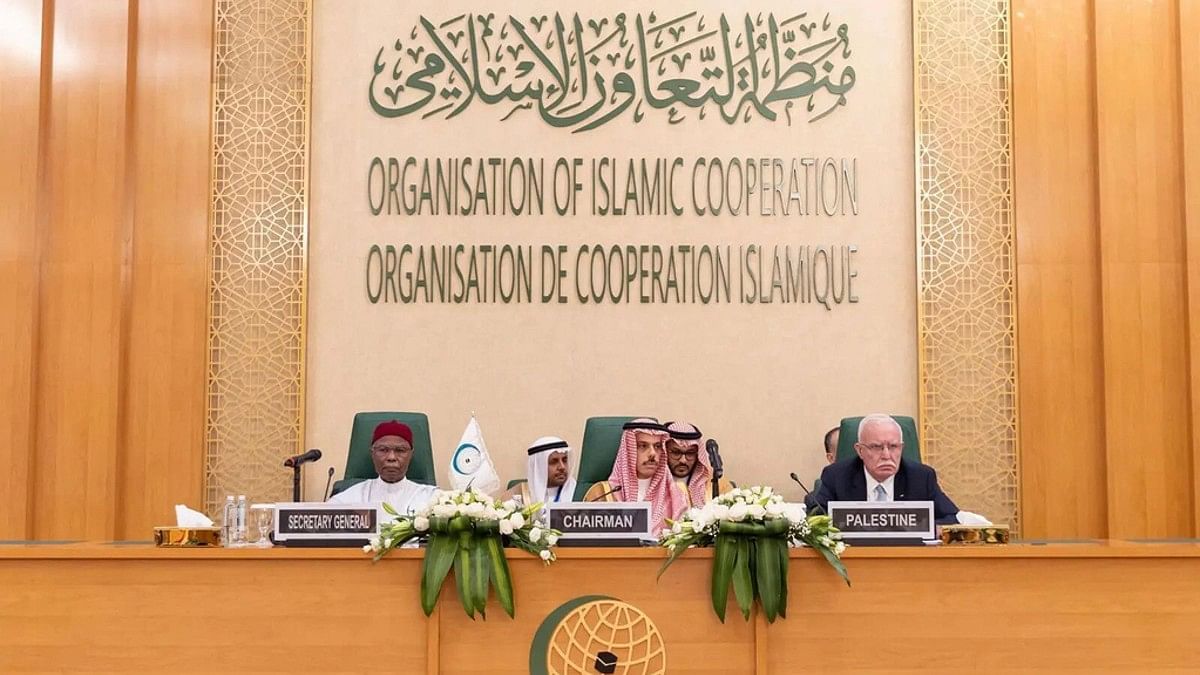
Al-Rantawi explains further: “The Arab nations are unified in pressuring Israel and the US on four subjects: provide Gaza with humanitarian aid, an immediate ceasefire, a prisoner exchange deal and aid to rebuild Gaza and its economy.”
A UN-brokered deal will allow for humanitarian aid to flow into Gaza from the Rafah crossing. More than 100 trucks are said to be sitting on the Egyptian side of the border, packed with food, water and medical supplies, waiting for the crossing to be opened.
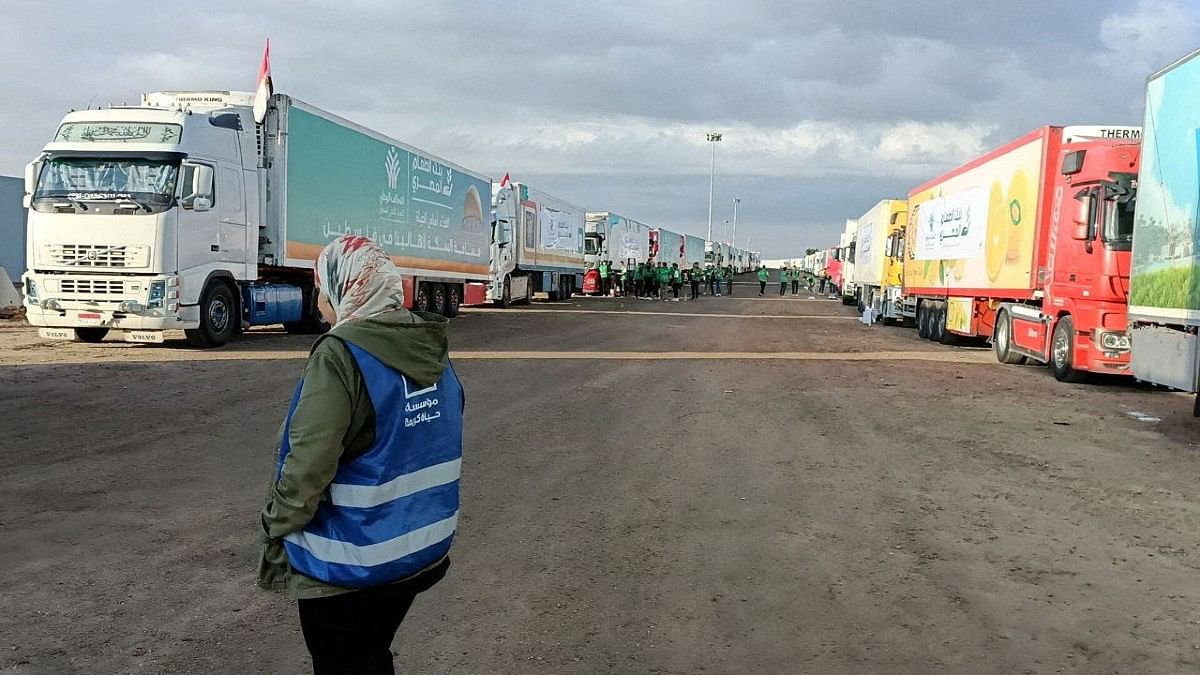
Al-Hroub, meanwhile, says governments in the region, especially in Jordan and Egypt, are worried that the Gaza hospital blast could lead to internal issues and spiral out of control.
“I think that many governments, especially Jordan and Egypt, are very worried that this could create internal issues. It could go out of control and affect the stability of this region. Especially in Jordan where over half of the people are Palestinians or are of Palestinian origin,” he tells ThePrint.
Thousands of protestors reportedly attempted to storm the Israeli embassy in Amman, Jordan, twice in the last three days. According to The Times of Israel, Tel Aviv had evacuated its embassy staff from Amman several days earlier.
“The people in Jordan are fearful that it would be next to be attacked by Israel if Tel Aviv is successful in its attempt to clear out Gaza,” says Al-Rantawi.
He also highlights the schism between the people and their rulers in the region, especially in the monarchies of the UAE and Morocco. “The people on the streets in the UAE and Morocco are angered by the normalisation of ties with Israel in return for nothing. Palestine still remains occupied,” he says.
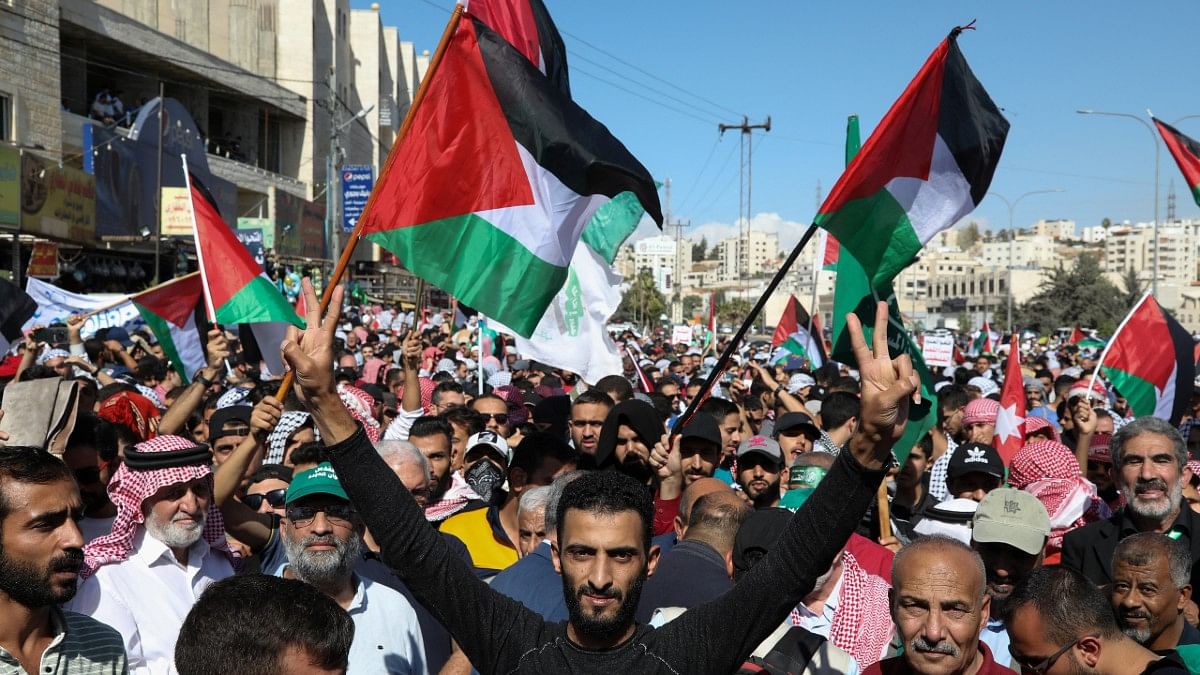
According to Seyed Emamian, an assistant professor at the Amirkabir University of Technology, Tehran, the blast at Al-Ahli Arab Hospital has challenged the governments in the region. “The public in the region are asking the politicians, why are you not doing enough? It has challenged all governments in the region. This required a response to satisfy the public, especially as the sentiments are with Palestine,” he tells ThePrint.
Nadeem Ahmed Moonakal, a research scholar at the Rasanah International Institute for Iranian Studies in Riyadh, tells ThePrint: “The sentiments in the Arab streets unquestionably demonstrate their enduring solidarity with Palestinians facing brutal attacks. The recent protests and demonstrations in Jordan, Lebanon, Libya, and Tunisia reflect the heightened tension in the region and the widespread anger and frustration.”
Unfolding humanitarian disaster in Gaza
The unfolding humanitarian disaster in the besieged Gaza Strip has angered civilians across the Middle East and North Africa. For days, demonstrations are being held in Morocco and Türkiye to express solidarity with Palestinians living in Gaza.
Mohammad Fitayani of The Palestine Red Crescent Society tells ThePrint that the situation in Gaza is worsening by the hour due to a shortage of medicine and medical equipment, adding that no aid is being allowed to enter, at least for now. “There is a lack of basic essentials such as food, water, clothing and blankets, and we are getting reports from our colleagues, and from operation rooms, in Gaza,” says Fitayani, currently in Ramallah.
Ghassan Abu Sitta, a British plastic surgeon who is in Gaza aiding local doctors in emergency care, said Thursday in a post on X (formerly Twitter) that doctors have had to purchase vinegar from a local shop to treat bacterial wound infections.
Vinegar from the corner shop to treat pseuodomonas bacterial wound infections. Its come to that. pic.twitter.com/mEE4haHMyj
— Ghassan Abu Sitta (@GhassanAbuSitt1) October 19, 2023
Israeli air raids against medical staff have resulted in the death of four members of Red Crescent Societies in Gaza, says Fitayani.
Grappling with the grief of losing his colleagues, he adds the challenges do not seem to stop and that it is close to impossible and illogical to evacuate patients from hospitals.
“There are plenty of high-risk patients, those who are in the ICU, we cannot shift and they stand to lose their lives if we do that. Further, there are a lot of refugees taking shelter in the hospital, these are people who have lost their homes,” he says.
But doctors in Gaza, he adds have decided to stay in the hospitals despite the hardships and constant threat to their lives.
(Edited by Amrtansh Arora)
Also Read: Pakistani cop wants to fight for Hamas’ ‘jihad’ against Israel. He’s been fired from the force


